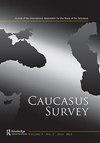Feeble projects and aspirations: the Caucasian and Transcaucasian federation/confederation in the geopolitics of 1918–1920
IF 0.5
Q3 AREA STUDIES
引用次数: 2
Abstract
ABSTRACT The collapse of central power in the Russian Empire 1917 left the peoples of the Caucasus alone in the midst of the havoc of the Great War. While political elites were forced to detach the region from Soviet Russia, they simultaneously realized that Transcaucasia could survive only in unity, and thus formed first a Commissariat and then a Federation. Yet geopolitics, the shared imperial legacy, the economic prognoses, the complex ethnic demography, and the existing boundary disagreements ultimately made federation impossible. Nevertheless, the victorious Allies of the Great War saw their interests in the Caucasian “package”, advising that a Federation or a Confederation be created in the region. This article examines the geopolitical significance of the discourse surrounding this proposed Caucasian and Transcaucasian federation/confederation.软弱的计划和抱负:1918-1920年地缘政治中的高加索和外高加索联邦/邦联
1917年,俄罗斯帝国中央政权的崩溃,使高加索地区的人民独自处于第一次世界大战的浩劫之中。虽然政治精英们被迫将该地区从苏联分离出去,但他们同时意识到,外高加索只有在团结中才能生存,因此首先形成了一个军需部,然后是一个联邦。然而,地缘政治、共同的帝国遗产、经济预测、复杂的民族人口统计以及现有的边界分歧最终使联邦不可能实现。然而,第一次世界大战的战胜国在高加索“一揽子计划”中看到了自己的利益,建议在该地区建立一个联邦或邦联。本文探讨了围绕这一提议的高加索和外高加索联邦/邦联的话语的地缘政治意义。
本文章由计算机程序翻译,如有差异,请以英文原文为准。
求助全文
约1分钟内获得全文
求助全文
来源期刊

Caucasus Survey
Arts and Humanities-History
CiteScore
1.30
自引率
9.10%
发文量
4
期刊介绍:
Caucasus Survey is a new peer-reviewed, multidisciplinary and independent journal, concerned with the study of the Caucasus – the independent republics of Armenia, Azerbaijan and Georgia, de facto entities in the area and the North Caucasian republics and regions of the Russian Federation. Also covered are issues relating to the Republic of Kalmykia, Crimea, the Cossacks, Nogays, and Caucasian diasporas. Caucasus Survey aims to advance an area studies tradition in the humanities and social sciences about and from the Caucasus, connecting this tradition with core disciplinary concerns in the fields of history, political science, sociology, anthropology, cultural and religious studies, economics, political geography and demography, security, war and peace studies, and social psychology. Research enhancing understanding of the region’s conflicts and relations between the Russian Federation and the Caucasus, internationally and domestically with regard to the North Caucasus, features high in our concerns.
 求助内容:
求助内容: 应助结果提醒方式:
应助结果提醒方式:


